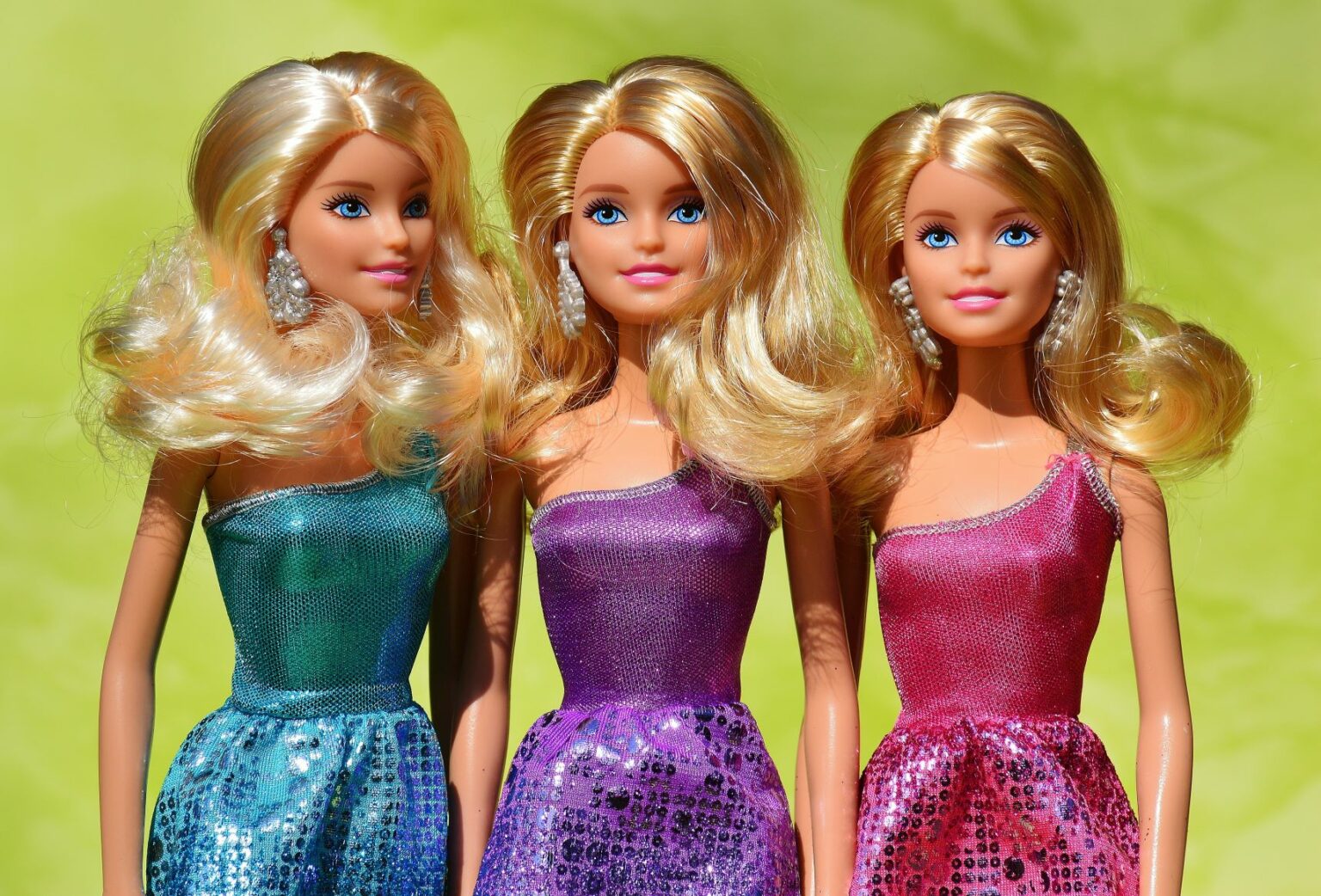When I put a few pages about Barbie in my latest book – We-mind vs Me-mind, published in July – I wanted to illustrate how what we’ve learned to value in ourselves and others is making a lot of people deeply unhappy and perpetuates the very situation we want to change. Unfortunately, the latest Barbie film has fallen into the same trap.
Film director Greta Gerwig has done a great job in exposing the biases and unrealistic expectations women face on a daily basis. She has managed to bring this situation to the attention of more people than ever with her blockbuster film. That’s exactly why it’s problematic, and such a missed opportunity to really change the world.
Blaming the men
As is fashionable nowadays, the film says ‘the patriarchy’ is behind the collective thinking that women can’t get it right and should be boxed in as a result. Not only does this affirm the outdated idea that all responsibility rests on male shoulders and only ‘the men’ can change the situation, but it keeps women in a position (and mindset!) of powerless victims. Moreover, calling the struggle for recognition the fight against the patriarchy forces men into a defensive position. At best, this discourages them from taking sides with women and indeed doing something about it, but it may even push them to fight back, as is happening more and more.
Even if Barbie does put up a fight and seems to win, it’s true: in real life, we can never win this battle as long as we keep making it about women against men. If, instead, we make it about what authentic strengths each of us brings to the table (more on that below), we might start making some mileage.
Brainwashing
In the film, Ken discovers how in the real world everything revolves around the well-being of men. That’s the patriarchy. He brings back the idea to Barbie World, where everything thus far has revolved around the well-being of Barbie. Barbie and all her incarnations are utterly self-centered creatures who don’t care a toss about the well-being of all the Kens. It’s very funny when Ken manages to ‘brainwash’ the Barbies into behaving like many women in the real world do: they cook, bring the Kens their drinks and clean up after them. The Kens feel very pleased, but interestingly, being like this makes the Barbies happy too.
The undoing of this ‘brainwashing’ is precisely what most efforts to better the position of women in the workplace focus on. Some writers even call it ‘internalized misogyny’. To be honest, I find that offensive. I refuse to believe that all of us who like to please others are secretly self-hating wrecks.
 In my book, I propose instead that we all have our unique blend of two minds which both are essential for our well-being. In a nutshell: our Me-mind focuses on our own well-being, sometimes even at the expense of others, and our We-mind has the well-being of others at heart, sometimes even at our own expense. Men tend to lean more to ‘me-mindedness’ and women more to ‘we-mindedness’. That said, all my research has shown that there are quite a lot of we-minded males and fewer me-minded females. The real problem of our world, as is unflinchingly reflected in Gerwig’s Barbie World, is that we value the ways of the Me-mind, and take for granted, or even despise the ways of the We-mind.
In my book, I propose instead that we all have our unique blend of two minds which both are essential for our well-being. In a nutshell: our Me-mind focuses on our own well-being, sometimes even at the expense of others, and our We-mind has the well-being of others at heart, sometimes even at our own expense. Men tend to lean more to ‘me-mindedness’ and women more to ‘we-mindedness’. That said, all my research has shown that there are quite a lot of we-minded males and fewer me-minded females. The real problem of our world, as is unflinchingly reflected in Gerwig’s Barbie World, is that we value the ways of the Me-mind, and take for granted, or even despise the ways of the We-mind.
Both minds come with their own priorities, desires, strategies and ways of communicating. But this Barbie film is a celebration of the Me-mind and a confirmation of the bias that we-minded people are inferior. The very thought that caring for others and being self-effacing might make you happy … ugh. The tone is set from the very beginning, when little girls start smashing their baby dolls the moment Barbie appears.
But we-mindedness is what keeps our society together. Instead of demanding that we-minded people be me-minded if they want respect, I’d like us to shift our values to include those of the We-mind.
Brilliance
In my book, I quote research that inspired Mattel to develop some unusual careers for Barbie, like being an astronaut. The psychologists from the Universities of Illinois, New York and Princeton justify the need for their study as follows: ‘common stereotypes associate high level intellectual ability like brilliance and genius with men more than women. These stereotypes discourage women’s pursuit of many prestigious careers. That is, women are under-represented in fields whose members cherish brilliance such as physics and philosophy.’
In the film, Barbie World is populated with brilliant Barbies. Interestingly, only Stereotypical Barbie doesn’t really seem to have a career. She’s just Barbie. If you ask me, this may be the real reason that she has the existential crisis that leads her to the human world.
As for the children who typically play with the doll, the above mentioned psychologists observed that at the age of five, girls and boys find themselves to be equally smart, but by age six, girls judge more boys as ‘really, really smart’ and stop playing games intended for those they identify as ‘really, really smart’. Instead, they are drawn to games for those who ‘try really, really hard’. Even if they still are just as smart as the boys, they stop calling themselves that.
The researchers seemed at a loss to explain the sudden change in the perception of brilliance amongst the girls. Gravely they state: ‘the present results suggest a sobering conclusion. Many children assimilate the idea that brilliance is a male quality at a young age. This stereotype begins to shape children’s interest as soon as it is acquired, and thus it’s likely to narrow the range of careers they will one day contemplate.’
I can’t help wondering whether, like the researchers clearly did, the girls in that study also viewed brilliance as superior to persistence, and if so, they thought boys were superior to them. Or is this what they learn later on from the grownups who still hold the bias that everything that boys tend to do is superior to what girls tend to do? In any case, the film perpetuates the stereotypical idea that ‘brilliant’ careers are what make us worthy in the eyes of others and our own.
That’s not to say that girls or women can’t be ‘brilliant’, just that we don’t value, nor reward those who choose a different path. The lack of recognition that so many women experience can be solved if we start respecting and rewarding we-minded work as much as we do me-minded work. That includes all the currently unpaid care we-minded people (women and men) give and are told to just stop prioritizing, but also the non-confrontational communication strategies of the We-mind we’re often told to replace with more assertiveness. Looking at the issue through the lens of the two minds rather than the gender lens makes this globally growing frustration a concern we can all engage with.

Throughout her existence, the many incarnations of the Barbie doll have reflected many roles of women in society. Barbie was never meant to role-model caregiving, although her creator, Mattel, tried. But pregnant Barbie was discontinued shortly after her appearance in 2002 because parents found it inappropriate or feared the doll could promote teen pregnancy (as if playing with baby dolls wouldn’t).
So at the end of the film, Stereotypical Barbie may abandon Barbie World, but the stereotype remains. And yet, along the way, the Barbies do become a tiny bit more we-minded. May that be a sign that times are changing at last.

